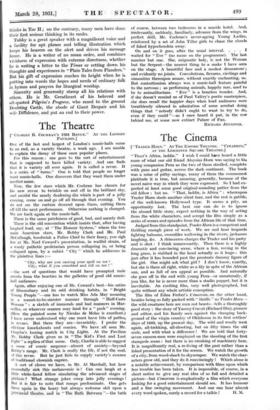The Theatre
U. CiLmi...as B. COCHRAN'S 1981 REVUE." AT THE LONDON
ONE of the last and largest of London's music-halls came to an end, as a variety theatre, a week ago. . I am unable to explain the decay of these once popular places.
For this reason : one goes to the sort of entertainment that is supposed to have killed variety. And one finds that it is variety all over again. It is called a revue. It is a series of "turns." One is told that people no longer want music-halls. One discovers that they want them under another name.
True, the few stars which Mr. Cochran has chosen for his new revue to twinkle on and off in the brilliant sky, and amidst the nearly deafening din which is part of a jolly evening, come on and go off all through that evening. You do not see the curtain descend upon them, cutting them off till the next performance. Otherwise nothing is changed. We are back again at the music-hall.
There is the same patchiness of good, bad, and merely dull.
There is the old convention which insists that, after having laughed loud, say, at "The Honour System," where the two main American stars, Mr. Bobby Clark and Mr. Paul McCullough, hoodwink a Police Chief to their fancy, you sigh low at Mr. Noel Coward's presentation, in wailful strain, of a wanly pathetic proletarian person collapsing in, or being collapsed upon, by a cubist " City " which he addresses in the plaintive lines :—
"City, why are you casting your spell on me ? City, what if you crumbled and fell on me ? "
—the sort of questions that would have prompted rude retorts from the hearties in the galleries of good old music- hall audiences.
Again, after enjoying one of Mr. Coward's best—his satire of Bloomsbury and its odd drinking habits, in "Bright Young People "—one has to watch Miss Ada May moaning in a meant-to-be-sinister manner through "Half-Caste Woman " : a sketch of immorals and bad manners in Mar- seilles, or wherever seamen may land for a "posh" evening. (Here the painted scene by Nicolas de Molas is excellent.) I have never understood why one must have bits of pathos in revues. But there they are—invariably. I prefer the old-time knockabouts and comics. We have all seen Mr. Chaplin's boxing match in City Lights. At the Pavilion Air. Bobby Clark gives us in "The Kid's First and Last Fight "a replica of that scene. Only, Charlie is able to suggest a sense of comic suspense—almost of anxiety—beyond Bobby's range. Mr. Clark is really the life, if not the soul, of this revue. But he just fails to supply variety's essence of traditional clownish caprice.
A sort of clown we have, in Mr. Al Marshall, but how mournfully sick this melancomic is ! Can one laugh at a little white-faced fellow simulating the advanced stages of phthisis ? What strange jokes creep into jolly evenings ! But it is fair to note that romps predominate. One gets them again in the hoary but always wplcome skit upon a Provincial theatre. and in "The Bath Between "—the bath of course, between two bedrooms in a seaside hotel. And, irrelevantly, suddenly, familiarly, advance from the wings, in perfect drill, Mr. Cochran's never-ageing Young Ladies, reinforced by a set of _John Tiller girls to chase the clouds of faked hypochondria away.
On and on it goes, after the usual interval. . . . I waited for " Eve " (no name on the programme). The last number but one. She, enigmatic lady, is not the Woman but the Serpent—the nearest thing to a snake I have seen on the stage. A beautiful face and a modest demeanour ; and evidently no joints. Convolutions, flexures, circlings and sinuosities thereupon amaze, without exactly enchanting, us. But contortionism always was a music-hall feature painful to the nervous ; as performing animals, happily rare, used to be to animalitarians. " Eve " is a boneless wonder. And, if she doesn't remind us of Paul Valery's poetic masterpiece, she does recall the happier days when loud audiences were breathlessly silenced in admiration of some acrobat doing things that "nobody didn't ought to want to try to do, even if they could "—as I once heard it put, in the row behind me, at some now extinct Palace of Fun.
RICHARD JENNIN'OS.














































 Previous page
Previous page